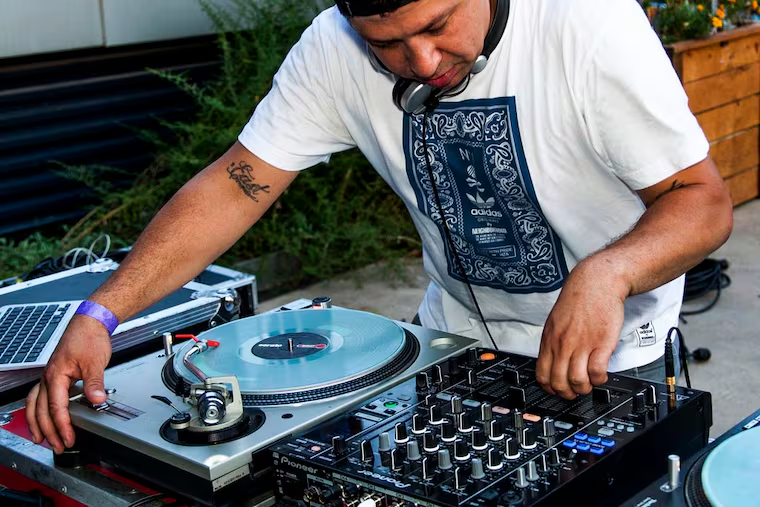A ‘DJ Academy’ gives Philly and Camden kids a chance to experience their musical heritage
The Philadelphia and Camden chapter of the national After-School All-Stars program has long provided free enrichment classes in a wide range of disciplines. But the recent 'DJ Academy' was a first.

The After-School All-Stars program has introduced thousands of Philadelphia and Camden middle school students to the possibilities of careers in robotics, fashion, engineering, mural arts, and even watershed management since 2014.
But the 2020 launch of a “DJ Academy” in the midst of the pandemic was a different sort of learning experience for students and teachers alike.
“The DJ Academy gave students a chance to dream,” said Christopher Pender, director of programs for the Philadelphia-Camden chapter of the national nonprofit After-School All-Stars program. “Cosmo and Carlo took the class to the next level.”
Cosmo Baker is a popular Philly DJ and veteran music educator. Carlo Aragoncillo directs the Jefferson Health program for veterans with traumatic brain injuries and is also an experienced DJ.
“Together they gave the students something to look forward to,” said Karen Medina, an assistant director at After-School All-Stars. “Despite the pandemic and the political turmoil on the outside, for one hour a week it was all about the students and the music.”
Older generations may think of DJs as disc jockeys spinning 45 rpm records on the radio or in discotheques. But revolutions in technology, music, and culture since the 1960s have expanded the DJ’s role into that of performer, producer, composer, and public figure.
Black and brown people in cities like Philadelphia have been the primary makers of this rich history, and the DJ Academy aimed to introduce the latest generation of Philly and Camden kids to a legacy that is theirs.
“Historically, Philadelphia has been looked at as one of the meccas of dance culture. We want the DJ Academy to show the kids they have a direct connection to the Black and brown dance culture of the 1960s and ‘70s,” said Baker. He became known as “the DJ who saved democracy” after keeping tense crowds outside the Pennsylvania Convention Center dancing in the streets as the Nov. 3 presidential election votes were tabulated inside.
“Today, a kid with a laptop could make a million-dollar track,” said Aragoncillo, the former director of Philadelphia’s office of veterans affairs.
“We wanted to introduce the students to where DJs started, and the evolution. We wanted to show them what it looks like inside a studio, and how you compose a mix.”
A follow-up to the “Message in the Music” online class that After-School All-Stars offered in the summer of 2020, the DJ Academy was proposed by Baker and Aragoncillo as an in-person experience. They envisioned students interacting live with the teachers and the technology, while observing social distancing, masking, and other coronavirus restrictions. They hoped to have students collaborate in making a piece of original music.
But finding a suitable location was difficult, and parents were concerned about in-person learning before vaccines became widely available. So about 15 students from fourth to eighth grades participated in six weeks of free DJ Academy classes on Zoom starting late last year and ending in January. After-School All-Stars hopes to hold a third iteration of the music/DJ program, with in-person classes, later this year.
Technical issues — school district laptops lacked the capacity to store and share music files — and “Zoom fatigue” notwithstanding, kids like Breanna Soto, 12, and Dulce Ortega, 11, enjoyed the classes. They had a chance to have a DJ nickname, like many professionals do: Soto transformed herself into DJ Hazel Clouds (a reference to an online persona), and Ortega used her middle name to become DJ Andrea.
“I always loved music and I always wanted to learn how to work with music,” said Soto, a seventh-grader at Conwell Middle Magnet School in Philadelphia.
“I was bored being stuck on my phone at home and I wanted to learn about being a DJ,” said Ortega, who’s in sixth grade at a Mastery Charter School in Camden.
The classes introduced the students not only to the digital wizardry of the studio, but to older genres of music. Among them: disco — once viewed by many as an anathema, but in recent years recognized for launching or sustaining the careers of Black artists and nurturing LGBTQ visibility at a time when straight, white, rock music reigned supreme.
Aragoncillo, who is Filipino American, said DJs hold a prominent place in the culture of the Philippines. “You can build a network and a business as a DJ,” he said. “For me, being a DJ has been a creative outlet. It’s helped me learn how to multi-task, how to read a crowd, how to understand a room full of people.”
Even in a Zoom room, the enthusiasm of the DJ Academy students was a joy.
“Especially now, with Covid, it was good to see the kids energized and excited, willing to cast aside their fears and maybe think about doing something they never thought of doing before,” said Aragoncillo.
Baker has taught the art and craft of DJing since becoming involved with the Scratch DJ Academy in New York in the early 2000s. More recently, he was director of Scratch DJ Academy Philadelphia for four years.
“The DJ Academy at After-School All-Stars can help set up kids to win,” said Baker. “It has everything to do with giving them access not only to the craft, but to wherever that craft is going to take them.”
Statements like that are music to the ears of Kelly Woodland, the executive director of the Philadelphia-Camden chapter of After-School All-Stars.
“We want our young people to try new things, to stretch and step out of their comfort zones,” said Woodland. “We want them to be more comfortable and confident in their own skin, and get them to the point where they want to try this, or that, and check things out, and not be afraid.”